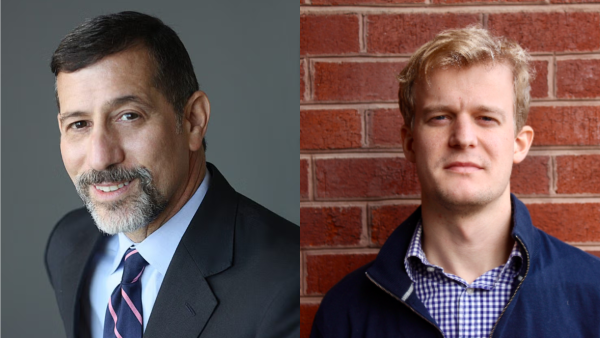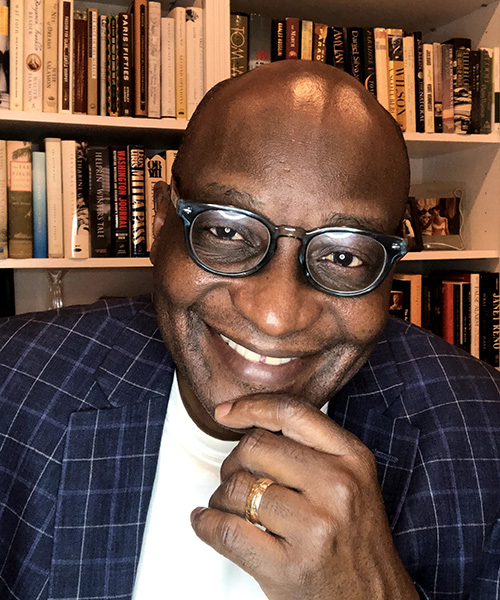Two Georgetown University professors won a top British award for their book on far-right terrorism in the United States, the Airey Neave Trust announced March 27.
Bruce Hoffman, a professor at the School of Foreign Service (SFS), and Jacob Ware, an assistant adjunct professor at the Center for Jewish Civilization (CJC), detailed the rise of terrorism and extremist violence in the United States in their January 2024 book titled “God, Guns and Sedition: Far-Right Terrorism in America.” The Airey Neave Trust, a London-based research institution focused on counterterrorism, awarded the prize, which is considered the preeminent award in terrorism studies, according to CJC director Jonathan Lincoln.
Ware said he and Hoffman aimed to recommend effective long-term peacebuilding solutions to extremist rhetoric and violence.
“Our ultimate goal is really rebuilding unity in our country and rebuilding trust in institutions and in people,” Ware told The Hoya. “The question of trust and unity is now a generational struggle for our country — that is not something that’s going to be solved this week, this month, this year. That is going to be something for our children to have to figure out.”
Ware said the book profiles how extremism spreads and creates long-term damage within the United States.
“I think our book tells an important story about a darkness within our country,” Ware said. “Our book tells a story of forces within our country that seek to divide us, that seek to undermine our democracy and that seek to hurt people, especially members of minority communities.
“At this very divisive and polarized moment, our book has insights about how these forces have been combated before, and I think it has an optimistic take on a path forward,” Ware added.
In their book, Hoffmann and Ware advocate for creating a specific domestic terrorism law, confronting misinformation on social media and promoting trust and unity.

Hoffman said he began researching extremist violence at the beginning of the COVID-19 pandemic as he saw conspiracy theories and violence proliferate.
“I’d been following it and writing about it, but it occurred to me that this movement was changing and that social media was abetting it,” Hoffman told The Hoya. “Social media weaponized this movement and has given it greater presence. These conspiracies were now circulating in a way that was inconceivable before.”
Hoffman said far-right terrorism increased as they wrote the book, notably when Donald Trump’s supporters stormed the U.S. Capitol in an attempted insurrection Jan. 6, 2021.
“We were writing this book in real time,” Hoffman said. “The fundamental arguments of the book about how this movement has evolved, had been on a violent trajectory that went beyond just hatred and intolerance to sedition was materializing before our eyes.”
Lincoln, who succeeded Hoffman as CJC director, said the book provides a novel outlook on far-right terrorism that speaks to the current political moment.
“Bruce and Jacob have shed incredibly important light on this topic and really helped us understand it a lot better,” Lincoln told The Hoya. “There’s, unfortunately, no obvious solution to this problem and no obvious way to combat it. But certainly it’s a critical aspect of the ongoing political debate in this country and across the world.”
Ware said the award demonstrates increasing attention to far-right violence in academic spaces.
“I feel that this award is recognition of the importance not just of the book but of the moment,” Ware said. “I think one of the reasons why we were awarded the prize is because there’s a lot of fear about this moment, and the more we can frame it in historical terms, contextualize it and advance sober and serious solutions, the better.”
Lincoln said Hoffman and Ware’s research and teaching enhance the CJC’s ability to engage students and academics alike.
“Their ongoing research, their teaching remains critical and we really want to do what we can to support their research and their efforts,” Lincoln said. “For me as a relatively new director here at Georgetown, it’s just an incredible atmosphere for me to be surrounded by really some of the top notch academics and researchers in their fields.”
Looking forward, Ware said fostering social cohesion will rely on cooperation to combat extremism.
“We’re in a battle, an existential battle for the values that many of us hold dear as a society,” Ware said. “People should engage in that battle. They should not shy away from it, because the path to our salvation lies in engagement, not in fear and division.”








